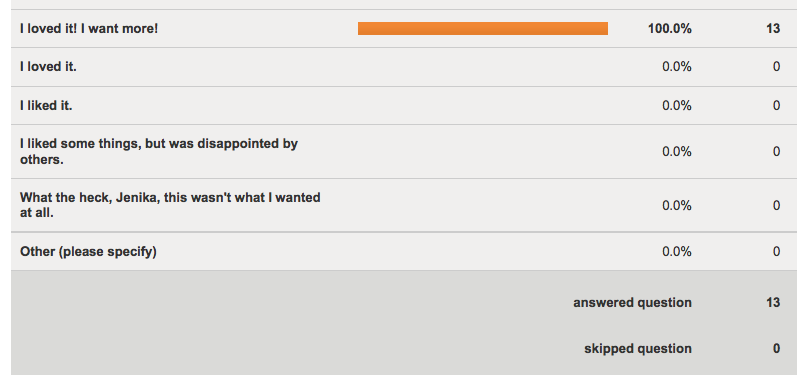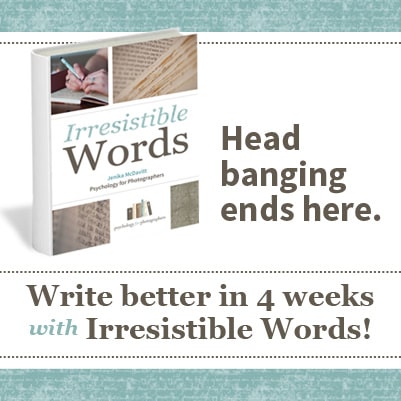The Blog Library
Don’t Publish A Post Until You’ve Checked This One Thing
I met some Psychology for Photographers readers at a conference awhile back. And one thing I did not expect:
I was shocked to meet you in person and have you be – well, strangers.
When I write this blog, I write like you’re sitting here in my little office. Settled into that oversized grey button chair over by the window. Usually, I read the the post out loud to you, you nodding along, occasionally picking up some curio from my shelf, and turning it over in your hands while you listen.

I already feel like we’re hanging out, so it’s just odd to meet you in person and not actually already know who you are.
This imagined hangout in my office is not just a crazy Jenika habit.
(Unlike my weird airport ritual of buying overpriced Mentos to eat on the plane. Or my inability to hold a piece of paper without folding it. This one isn’t crazy.)
Before you publish a post, pull up a chair with a reader – whether they’re there or not. Read it out loud to them. This does several fascinating things to your writing:
1) It slows you the heck down.
Unless you do voiceovers for car commercials, you can probably read faster in your head than you can out loud.
And when we read quickly, we miss things. Especially when we’ve read them before – our brain “fills in” what we “meant” to say. We don’t see that what we actually wrote makes zero sense.
A quick read aloud is a dragnet that scoops up typos, unclear words, redundancies, and other issues in one fell swoop. Love that efficiency.
(Also? It prevents embarrassing omissions, like leaving a critical letter out of the word “shirt.” Which happened to my husband’s colleague recently in a department-wide email. Oops.)
2) It forces you to be concrete.
Remember how we talked about giving examples last week?
When you’re explaining an idea to someone in person, and you see their eyes glaze over, you automatically pivot to more concrete examples:
What’s that, Grandpa? That “Facebook thing“? It’s a social networking site where you set up a profile page and “friend” people.
:: Grandpa glazes over ::
Think of it like a neighborhood where all of your friends are. They can come visit and see what you’re doing. You can put up pictures, or write little updates. Only, it can help you keep in touch with people all over the world.
Don’t leave grandpa – or your readers – feeling confused.
No one wants to be confused, and no one wants to admit they’re confused.
If you read it and realize you can’t even follow your own words, you’ll automatically swap it with something clearer.

3) Reading out loud focuses your thoughts to write to the one, not the one thousand.
Thousands of people just like you will read this post. But you don’t care about the other 999+. You care what you get out of it.
So if I write “over your head” like I’m talking to a big crowd, it makes you feel smaller. Less important. When, in fact, you, right there, matter the most.
There’s a subtle shift when you go from thinking you’re writing to a crowd vs. to one single person. An important shift. One that means the difference between someone coming back – or not.
They’re not reading it with a group of people huddled around their computer – they’re reading it solo. So talk to them – solo.
4) Most importantly: Reading out loud prevents you from sounding like you swallowed a corporate memo.
You’ve got your own business style and the voice you want for your brand – so mileage may vary here.
But I see plenty of photographers talk about being “real” and “intimate” and “unposed.” And then they write on their websites like they’re frantically trying to keep everyone at arm’s length.
One photographer commented on the 7-Minute Writing Makeover post: “I seriously didn’t know I was ALLOWED to do half these things. I’ve been struggling to “sound like a business” instead of writing in a way that comes more naturally to me.”
Yes, you’re allowed to talk like you would to a friend. I hereby give you permission. :: waves magic permission wand ::
Happily, there’s a difference between being unprofessional and being relatable. Writing in a conversational tone does not need to “bring your brand down” or make you “folksy” or even “less serious” – but it can bring your brand closer to your clients.
Lest you think I’m pants-on-fire lying, let’s look at the sportswear industry.
Lululemon, a pricey-but-quality purveyor of yoga clothing, could describe itself as a company “bringing you the highest-quality clothing for all your workout needs.”
Instead, check out what Google shows when you search for them:

“Sweaty”? Hardly an instinctively appropriate word for a high-end store – one that sells more per square foot than any of its competitors.
But consider for a moment: If you were recommending workout clothing to a friend, would you say “this store has the highest-quality clothing for all your workout needs”?
Or would you say something closer to: “You know how you get all sweaty and your clothes stick to you? Yeah, Lululemon doesn’t do that.”
Go back to Lululemon’s Google listing and absorb (heh) the genius-ness of the word choice. Instead of positioning themselves as the be-all end-all of high-priced workout gear that you’re afraid to actually work out in, they transformed themselves into an honest, down to earth place that makes clothes for people who sweat.
And you know what? We’re primed to ignore marketing speak anyway. We don’t care about Captain Corporate America.
You might as well sound like you.

You don’t have to go too far with it – high school senior photographers don’t need a headline that says “I’m a gr8 photographer.” But you might change “The day before the session, I’ll notify you via phone” to “I’ll text you the day before our session to check in.” A subtle, still-true-to-you change that shows them that you get who they are, and handle things the same way they do.
Read your words out loud before you hit publish. Whether you do it like me and read it to an imaginary friend in a grey button chair, or call a real friend and do it over the phone – try it out. I predict that you’ll start sounding at least 50% warmer and find more people following your work.

If you’ve been reading this blog over the past month, you can probably tell I care a lot about this ‘writing stuff.’
It’s because I can’t think of a single other thing I could teach you that would have a bigger impact on your business.
At the least, you need writing to:
– market
– blog
– build a website
– engage on Facebook or Twitter
– email clients
– reach out to businesses
– maintain relationships with past clients
– send newsletters
– apply for small business grants
We often treat all of the above as if they were separate entities.
And that gets overwhelming, because you feel like there’s always “one more thing” you need to learn how to do.
When, in fact, improving your writing makes you simultaneously better at every single thing on that list, plus more.
As someone who hates having their time wasted, that sounds pretty good to me.
So last summer, I taught a small writing course. I was a little shy about it – writing isn’t one of those glitzy glamoury biz topics. In fact, when I put up the registration page, a wash of terror flooded over me, and I turned to my husband and said “What if no one books? I’m going to feel so stupid.”
But then. It sold out two days before registration was set to close.
And at the end, every single person said they loved it and wanted more.
(Literally everyone – I sent an anonymous survey and here are the exact responses when I asked how they rated it overall. There were 14 students, one had a family emergency and had to delay participation, so all but that one chose to fill out the survey):

Then I started getting flooded with emails from photographers, designers, ophthalmologists (seriously), and all manner of folks asking when I was doing the course again.
And I realized that even if I taught the course nonstop, back to back, all year – a live course couldn’t fit everyone.
I will do the live course again, but I know not everyone will be able to participate. And some people would rather study on their own.
And what I have to teach about writing is too important not to share widely. I’ve taught these exact things to help people get more business, gain admission to Ivy League universities, land prestigious scholarships, advocate for change in their community, and generally align their life with their goals.
 So, I have released Irresistible Words – a persuasive writing e-course you can take all on your own – and completely transform your writing.
So, I have released Irresistible Words – a persuasive writing e-course you can take all on your own – and completely transform your writing.
I know. Writing. It might dredge up all manner of acid-stomach, doomy feelings. It doesn’t “sound like” a priority. In fact, it sounds like something that should get stuck in a shoebox and never be looked at.
But like I said before: I hate wasting time. I hate spending hours on things that should take twenty minutes. And strong writing has made me faster and better at nearly every business task there is.
This course isn’t about sitting around debating commas and grammar.
The first half empowers you to connect more deeply to your audience, and the second half teaches you exactly how to craft words that sell the heck out of whatever it is you’re selling.
And yet, you come away from it sounding more like you.
Most importantly, it’s about letting the writing do the work for you. Being able to quickly hit “publish” knowing the money will follow.
And it comes with a free email sequence that you can start at any time, which helps you actually complete the course rather than let it languish on your hard drive. (None of this: Oh hello there, course I bought three years ago. I forgot you even existed. You’re going to actually get this done.)
More soon.
For now, savor your day.

Irresistible Words is here!


YES!!! I am stoked that you will be offering this online, I really wanted to take the summer class!
Great post! This is a useful thing for anyone trying to write in a more accessible way. I stumbled onto this approach awhile back, and now read aloud through my posts, usually several times, before I hit publish. It works exactly like you describe here, and it helps me as I try to write with a more natural voice… my speaking voice as it were. My writing “muscle memory” got wired into a very stilted manner through many years of heavy techno/business writing in my day job, and I’ve been trying to get out of that for a long time. 🙂
Somebody commented to me awhile ago, “for a photographer you sure write a lot”. I realized writing is a lot more important for me going forward than I originally thought it would be. So I’ll be interested to check out your course…
Loved it Jen!
Jenika, I’ve been absolutely blown away by literally every single thing you’ve written and shared so far. I will certainly do a better job of telling you how awesome you are once I get my hands on this course, but I feel like Christmas is coming early this year. I cannot wait!
Super excited for you, Jenika! I know the course is going to be great!
Well isn’t this just perfect timing! My studio manager and I were having a debate today because he was insisting that I should change my grammar in a recent blog. (He’s the resident grammarian and my husband to boot so we can have deep, impassioned convos about stuff like this.) I wanted to use a sentence that stated “I think I’m better than her.” He wanted it to (correctly) say “I think I’m better than she.” Seriously? Who talks like that? Thank you for granting permission to say it like you speak it, Jenika. Grammarians, please cover your ears. I’m keeping it real.